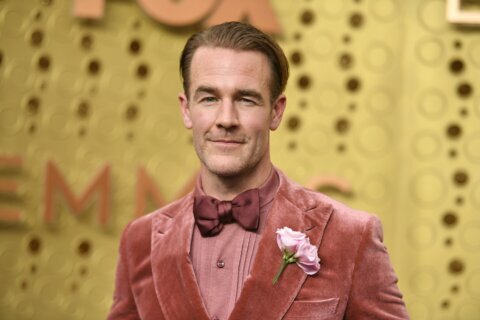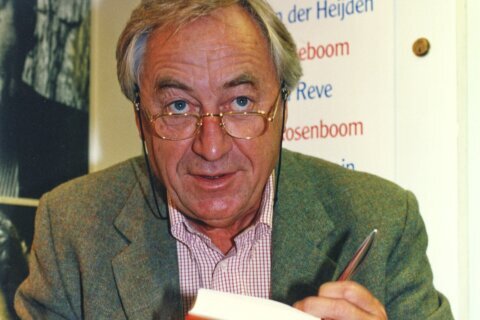WASHINGTON — Once upon a time, Black America accused police of brutality fueled by racial profiling. White America worried that upstanding officers were being slandered by a few bad apples. And good hearts on both sides watched in shock as entire cities were burned to the ground by riots.
N.W.A. was born in 1988, in the run-up to Rodney King and the L.A. Riots, and the 2015 movie about their rise arrives in the aftermath of Trayvon Martin, Eric Garner and Freddie Gray, as racial fires still burn from Brooklyn to Ferguson, Baltimore to Charleston.
That’s the powerful timing of “Straight Outta Compton,” an urgent work with a surprising amount of social relevancy for a tale 30 years in the making.
The film opens in 1987 with the young-adult angst of Dr. Dre (Corey Hawkins), Ice Cube (O’Shea Jackson Jr.), Eazy-E (Jason Mitchell), MC Ren (Aldis Hodge) and Dj Yella (Neil Brown Jr.), who combine to form the rap group N.W.A. in Compton, Los Angeles under the management of Ruthless Records founder Jerry Heller (Paul Giamatti). The group is immediately controversial, thanks to an unprecedented swagger and refusal to mince words, hitting back hard against social and economic injustices, while bringing warnings from the FBI and discomfort from Middle America.
The film opens with a line from the title song, which is less of a song lyric as it is a promise: “You’re about to witness the strength of street knowledge.” Director F. Gary Gray provides just that.
After getting his start directing rap videos, including Ice Cube’s “It Was a Good Day,” Gray made his directorial film debut with the hit comedy “Friday” (1995). From there, he rattled off solid efforts in “The Negotiator” (1998), the remake of “The Italian Job” (2003) and “Law Abiding Citizen” (2009).
Now, it’s safe to say that “Straight Outta Compton” is his most fully realized effort yet.
The film’s biggest strength is its spot-on casting, compiled by casting director Cindy Tolan (“Blue Valentine,” “The Place Beyond the Pines”). We’re given license to get lost in the movie because the on-screen players feel almost identical to their real-life counterparts, particularly Ice Cube’s real-life son, who masters his fathers facial expressions. While Jackson Jr. is a spitting image of Cube, Hawkins brings to life the record-spinning genius of Dre, while Mitchell steals the show as Eazy-E, projecting an admirable — if misguided — loyalty to the man who gave him his big break.
There are also commendably believable bit portrayals of 2Pac and Snoop Dogg by Marcc Rose and Keith Stanfield, respectively. You’ll remember Stanfield as both the rapping teen Marcus in “Short Term 12” (2013) and Jimmie Lee Jackson in “Selma” (2014). You won’t remember Rose from anything, plucked from obscurity because he looks and sounds exactly like Pac singing “Hail Mary.”
At times, the movie is guilty of too much name dropping, giving us everyone from Suge Knight to The D.O.C. to Warren G. By the same token, it almost tries to cover too much ground, starting with the N.W.A. boys meeting in 1987 and going all the way to Dre leaving Knight’s Death Row Records to form his own company, Aftermath, in 1996. “Compton” dangerously charts a similar path as “The Butler,” covering a wide chronology, as opposed to “Selma,” which focused on a specific slice.
It’s also guilty of barely exploring subplots involving the rappers’ relatives. Mothers, brothers and lovers are all routinely introduced but given only lip service. Perhaps these family members were included to please co-producers Ice Cube and Dr. Dre, proving that real-life celebrities shouldn’t have a hand in making a movie about themselves. Rather than story beats, we get “Beats by Dre.”
There are plenty of things to nitpick by critics actively looking for flaws — the biggest being the misogyny of a punchline that comes at the expense of a woman at a hotel sex party — but each of these flaws is countered with a hard dose of reality. Sure we see Eazy-E bragging about his promiscuity, but we then see him paying the consequences with his much-publicized AIDS diagnosis.
Before throwing rocks at the movie based on one specific scene, withhold judgment and consider what the film is trying to say in its entirety. This advice is most important during the film’s handling of its most controversial subject: police brutality. We see the daily harassment that caused the group to sing “F — k the Police,” just as we see Dre driving through the L.A. Riots in slow motion, surveying the burning city and sharing a solemn glance with the police chief, wondering if it all was worth it.
The fact that Gray even has the courage to wade into this topic is not only commendable, it’s necessary. Surely, the film won’t win converts from those who think “F — k the Police” went too far. All Gray is doing is asking us to do is listen, think and somehow come out wiser on the other side.
Gray presents shades of gray. No issue is black and white — especially issues of black and white. Time and again, we’ve seen bad situations made worse by inflammatory actions, either by the willful ignorance of folks blind to their own privilege, or rushes to judgment by slogan-driven activists.
So let’s stop inflaming and start listening. Let’s stop name calling and start healing. There are real concerns here, rooted in actual grievances built up over the decades, clouded further by reverse resentments and mankind’s dangerous flaw of territoriality. We can’t wash all of this away overnight with one movie, but surely there are some common ideas we can all agree upon as a starting point:
Can’t we agree that racism still exists in many forms — from the personal to the societal?
Can’t we agree that not all cops are bad — that most are decent, hardworking Americans?
Can’t we agree that the democratizing power of a cellphone camera is a good thing — and that putting body cameras on police officers is a good way to end the “he said, she said” disputes?
Can’t we agree that peaceful protests are far more constructive than burning down mom-and-pop stores run by our own hardworking neighbors — often people of color themselves?
Can’t we agree that mass shootings are a national disgrace in dire need of a better system to keep military-style weapons out of the hands of convicted criminals and the mentally ill?
Can’t we agree that day-to-day gun violence — from backwoods disputes to drive-bys in city streets — should receive equal attention and moral outrage as the mass shootings?
Can’t we agree on the amazing grace of Charleston victims’ families saying, “I forgive you” to the gunman, revealing the beautiful irony that this deranged goal of a race-war backfired into love?
And once and for all, can’t we agree that our pop culture — from movies to music — should become smarter, favoring social commentary over materialistic and misogynistic glorification, creating art that’s less vulgar and less violent, art that we can be proud to show our grandkids — just as our ancestors proudly showed us Marvin Gaye, Sam Cooke, Jackie Wilson and Stevie Wonder?
Our culture is stronger when a genre’s brightest talents aren’t gunned down in coast-to-coast gang wars. Here’s hoping we bend the curve of history closer toward “Keep Ya Head Up” and further away from “Hit Em Up.” We aren’t beholden to our past. There is always a better way forward. But in order to move forward, we must assess what got us here. “Compton” does this urgently and thoughtfully.
It may not change cinema the way the song changed music — paling in comparison to masterpieces like Spike Lee’s “Do the Right Thing” (1989) and John Singleton’s “Boyz n the Hood” (1991) — but it’s a 2 1/2 hour epic that never once loses our attention. As we watch N.W.A. catch fire, roar to success and flame out, leaving a legacy of influence revealed in the end credits, “Compton” surpasses the semi-autobiographical “8 Mile” and the lackluster “Notorious” to become the best rap biopic ever made. Sure, that’s a big fish in a small pond, but in this genre, “fish is our favorite dish.”
★ ★ ★ 1/2
The above rating is based on a 4-star scale. See where the film ranks in our Fraley Film Guide. Follow WTOP Film Critic Jason Fraley on Twitter @JFrayWTOP.








